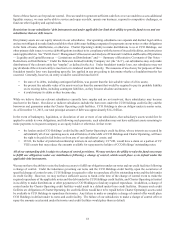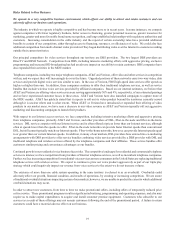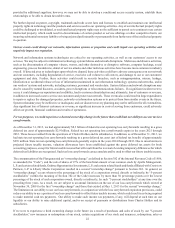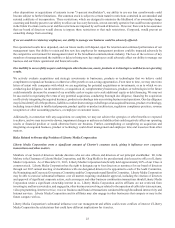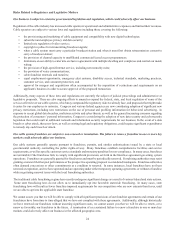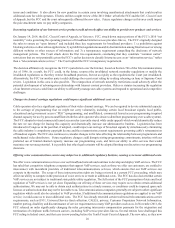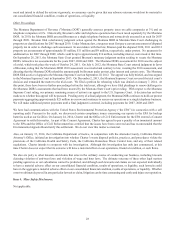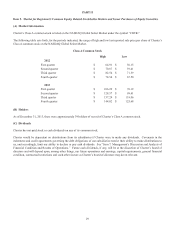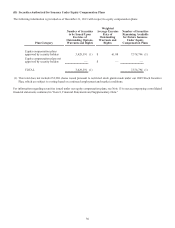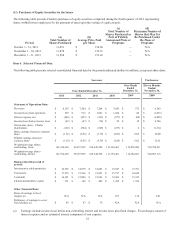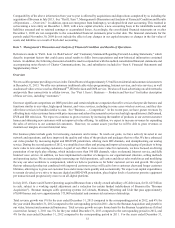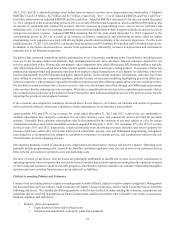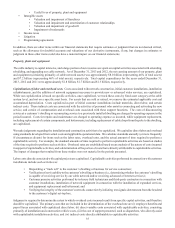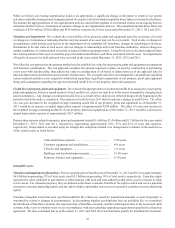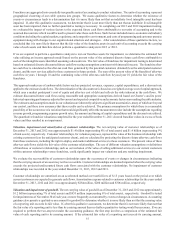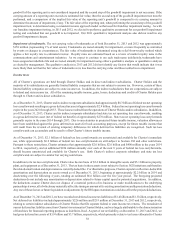Charter 2013 Annual Report Download - page 42
Download and view the complete annual report
Please find page 42 of the 2013 Charter annual report below. You can navigate through the pages in the report by either clicking on the pages listed below, or by using the keyword search tool below to find specific information within the annual report.
28
merit and intend to defend the actions vigorously, no assurance can be given that any adverse outcome would not be material to
our consolidated financial condition, results of operations, or liquidity.
Other Proceedings
The Montana Department of Revenue ("Montana DOR") generally assesses property taxes on cable companies at 3% and on
telephone companies at 6%. Historically, Bresnan's cable and telephone operations have been taxed separately by the Montana
DOR. In 2010, the Montana DOR assessed Bresnan as a single telephone business and retroactively assessed it as such for 2007
through 2009. Bresnan filed a declaratory judgment action against the Montana DOR in Montana State Court challenging its
property tax classifications for 2007 through 2010. Under Montana law, a taxpayer must first pay a current assessment of disputed
property tax in order to challenge such assessment. In accordance with that law, Bresnan paid the disputed 2010, 2011 and 2012
property tax assessments of approximately $5 million, $11 million and $9 million, respectively, under protest. No payments for
additional tax for 2007 through 2009, which could be up to approximately $16 million, including interest, were made at that time.
On September 26, 2011, the Montana State Court granted Bresnan's summary judgment motion seeking to vacate the Montana
DOR's retroactive tax assessments for the years 2007, 2008 and 2009. The Montana DOR's assessment for 2010 was the subject
of a trial, which took place the week of October 24, 2011. On July 6, 2012, the Montana State Court entered judgment in favor
of Bresnan, ruling that the Montana's DOR 2010 assessment was invalid and contrary to law, vacating the 2010 assessment, and
directing that the Montana DOR refund the amounts paid by Bresnan under protest, plus interest and certain costs. The Montana
DOR filed a notice of appeal to the Montana Supreme Court on September 20, 2012. The appeal was fully briefed, and was argued
to the Montana Supreme Court in September 2013. On December 2, 2013, the Montana Supreme Court reversed the trial court’s
decision and remanded the matter to the trial court. We filed a petition for rehearing which was denied on January 7, 2014. At
this point, there have been no further proceedings before the trial court, although we have filed pleadings to renew challenges to
the Montana DOR’s assessments that had been mooted by the Montana State Court’s prior ruling. With respect to the Montana
Supreme Court ruling, our primary remaining course of action is an appeal to the U.S. Supreme Court. A decision has not been
made as to whether this appeal will be pursued. Pending entry of a final judgment, the Montana DOR continues to hold our protest
payments aggregating approximately $25 million in escrow and continues to assess our operations as a single telephone business.
We will make additional protest payments until a final judgment is entered, including payments for 2007, 2008 and 2009.
We have had communications with the United States Environmental Protection Agency (“the EPA”) in connection with a self
reporting audit. Pursuant to the audit, we discovered certain compliance issues concerning our reports to the EPA for backup
batteries used at our facilities. On January 24, 2014, Charter and the Office of Civil Enforcement for the EPA entered a Consent
Agreement to settle this matter. As part of the Consent Agreement, Charter has agreed to pay a penalty of an immaterial amount
to the EPA and the Office of Civil Enforcement has certified that the issues have been corrected and has recommended that the
Environmental Appeals Board ratify this settlement. We do not view this matter as material.
Also, on January 15, 2014, the California Department of Justice, in conjunction with the Alameda County, California District
Attorney’s Office, initiated an investigation into whether Charter’s waste disposal policies, practices, and procedures violate the
provisions of the California Health and Safety Code, the California Hazardous Waste Control Law, and any of their related
regulations. Charter intends to cooperate with the investigation. Although this investigation has only just commenced, at this
time Charter does not expect that its outcome will have a material effect on our operations, financial condition, or cash flows.
We also are party to other lawsuits and claims that arise in the ordinary course of conducting our business, including lawsuits
claiming violation of anti-trust laws and violation of wage and hour laws. The ultimate outcome of these other legal matters
pending against us or our subsidiaries cannot be predicted, and although such lawsuits and claims are not expected individually
to have a material adverse effect on our consolidated financial condition, results of operations, or liquidity, such lawsuits could
have in the aggregate a material adverse effect on our consolidated financial condition, results of operations, or liquidity. Whether
or not we ultimately prevail in any particular lawsuit or claim, litigation can be time consuming and costly and injure our reputation.
Item 4. Mine Safety Disclosures.
Not applicable.


